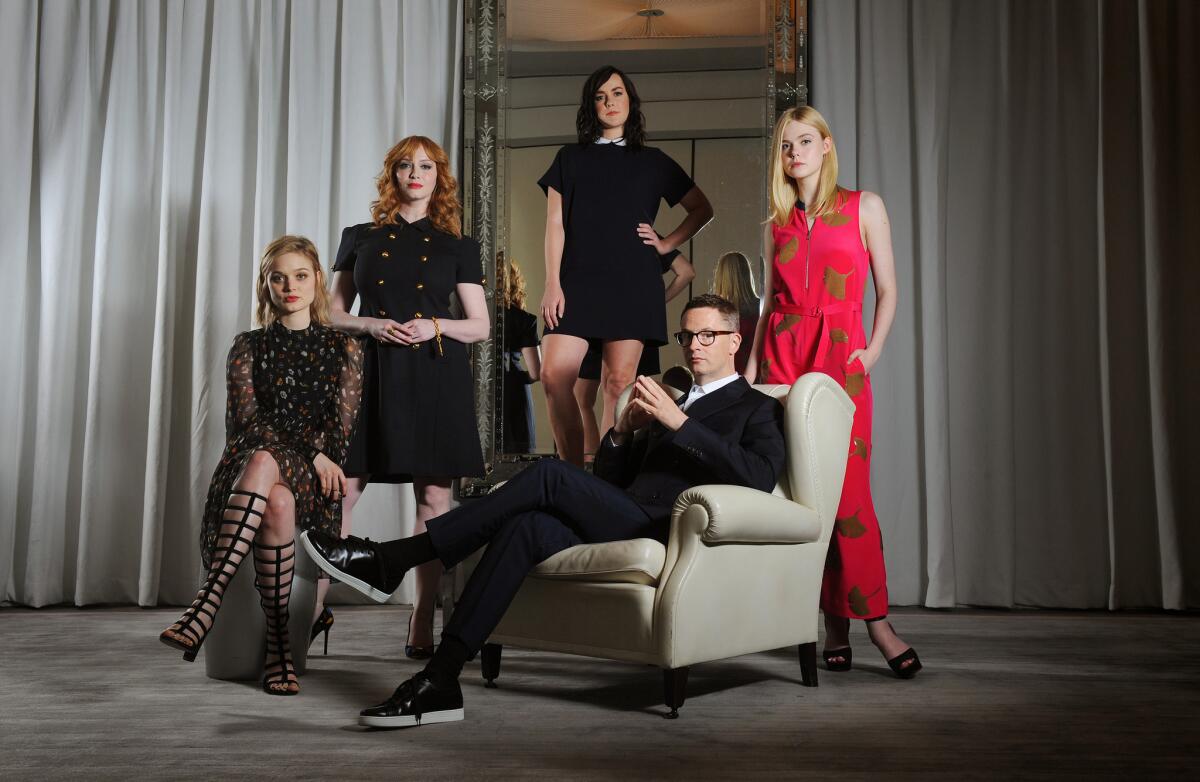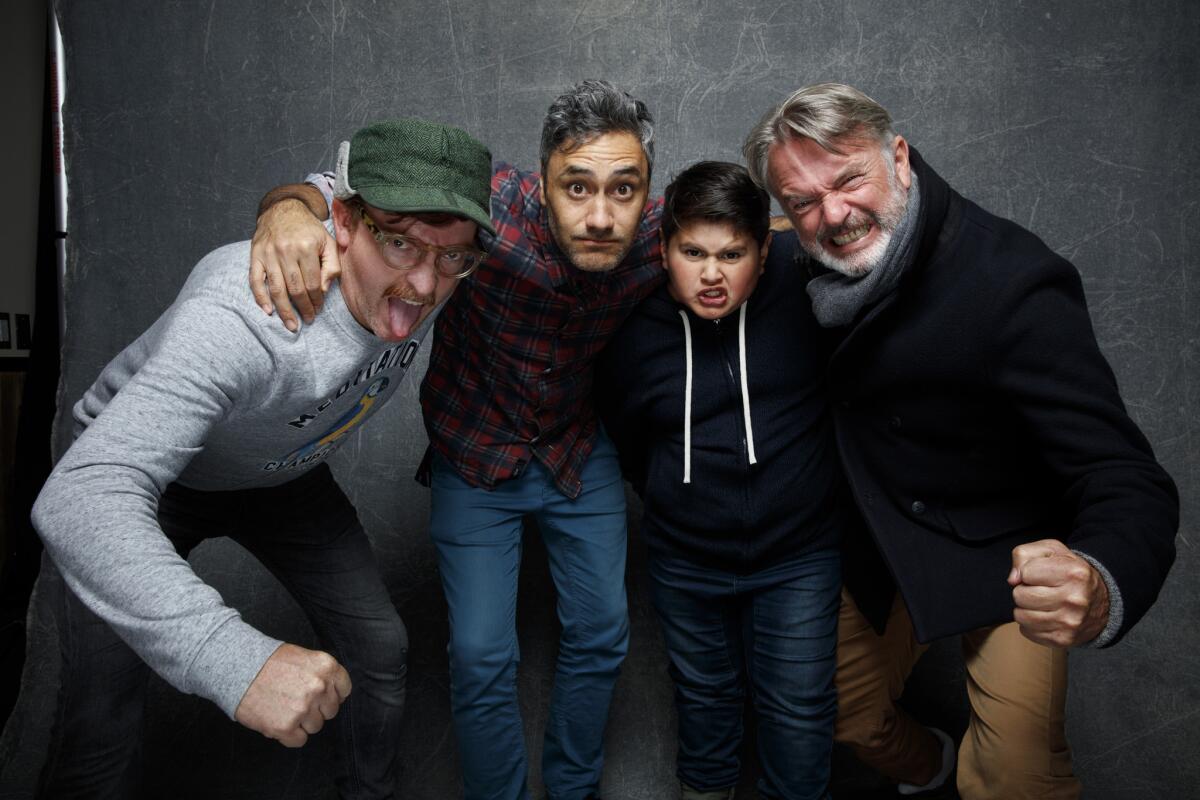Newsletter: Indie Focus: Beat blockbuster blues with ‘The Neon Demon,’ ‘Swiss Army Man’ and ‘Hunt for the Wilderpeople’
Hello! I’m Mark Olsen, and welcome to your weekly field guide to a world of Only Good Movies.
As further proof that there are more good movies out there than we know what to do with — both as counter-programming to the blockbuster blues and any cockamamie ideas that movies don’t matter anymore — this week we’re featuring four new releases. Which also means that we’re making room up top for an older title.
An L.A. screening of the recent restoration of Ousmane Sembene’s first feature, “Black Girl,” which celebrates its 50th anniversary this year, is a reason for excitement. (And also a good reason to leave the house.) A.O. Scott recently called the film “at once powerfully of its moment and permanently contemporary.”
This week we’ll have a screening of the upcoming movie “Captain Fantastic” on June 29 followed by a Q&A with writer-director Matt Ross. The film premiered earlier this year at the Sundance Film Festival and has since picked up awards at festivals in Cannes and Seattle.
Check events.latimes.com for more info.
Nonstop movies. Movies nonstop.

‘The Neon Demon’
Following his moody explorations of wounded masculinity in films such as “Drive” and “Bronson,” filmmaker Nicolas Winding Refn turns his eye to women with “The Neon Demon,” a story of young models in L.A. starring Elle Fanning, Jena Malone, Bella Heathcote and Abbey Lee.
“I don’t really want to know how it’s going to turn out,” Refn said to me last year when I spent some time on set. I caught up again with Refn and his cast more recently when the film premiered here in Los Angeles.
With its provocative, stylish and bloody look at the world of beauty, the movie has generated some of the most divergent responses of the year. In The Times, Justin Chang wrote: “If that sounds like a paradox, it’s closer to perfection: a Helmut Newton fever dream crossed with a Dario Argento splatter flick. To dismiss this movie as style over substance is to miss the point.”
In the New York Times, Glenn Kenny called it “ridiculous and purile” and said of Refn, “his work looks like that of a technically adept, emotionally stunted adolescent who’s not nearly as bright as he thinks he is.”
At MTV, Amy Nicholson said the film is “like a pin-up in horn-rimmed glasses: they look smart, and we’re content with the illusion … ‘The Neon Demon’ wants to have its cheesecake and condemn it too.”

‘Wiener-Dog’
Todd Solondz looks like someone who would get beaten up in a Refn film. And that has always been one of his strengths, his ability to face down expectations. His latest, “Wiener-Dog” is another startling, surprising film, a series of stories connected by the presence of a dachshund.
I recently spoke to Solondz about the film and his choice of animal. He said, “it’s hard sometimes to look at a dog as a dog, when so much of what a dog does is refracted through the way humans read things and project onto a dog. And so much of what a human projects onto a dog is reflective less of the dog than the human.”
In his review for The Times, Justin Chang wrote that Solondz “never lets those charms distract him from the dog’s chief purpose, which is to bear witness to a rich and appalling spectrum of human idiocy, misery and self-absorption. She is both man’s best friend and a stark reminder that mankind is its own worst enemy.”
In the New York Times, A.O. Scott wrote that audiences “don’t expect documentary-style naturalism from Wes Anderson, bittersweet romance from Quentin Tarantino or violent action from Whit Stillman. And we don’t turn to Mr. Solondz for warm affirmations of human decency.”
In LA Weekly, April Wolfe wrote that the film “has the look of cheesy, innocuous after-school drama, but his dialogue is set to search and destroy hypocrisy. ‘Wiener-Dog’ has some sharp teeth and stands on its own awkward little legs.”
‘Swiss Army Man’
Among the more confounding films of the year is “Swiss Army Man,” better known to many as “the Daniel Radcliffe farting corpse movie,” the debut from the directing team known as the Daniels. I caught up with Daniel Kwan and Daniel Scheinert recently in Highland Park, and as Scheinert explained, “Take it to where farts aren’t funny and corpses aren’t gross … an existential fart drama.”
In his review for The Times, Robert Abele said the movie “certainly expels a lot in trying to convince you its bruised-emo wilderness yarn is whimsically imaginative … While the movie focuses on one end of the body, you might be left sighing from the other.”
At RogerEbert.com, Matt Zoller Seitz wrote, “The film is elastic, transmogrifying from a psychological drama into a literally excremental comedy and then a hard-edged survival picture … there’s ultimately no point trying to deal with “Swiss Army Man” on any terms but its own.”
In the New York Times, Jeannette Catsoulis said of the film, “impossible to categorize, this stunningly original mix of the macabre and the magical combines comedy, tragedy, fantasy and love story into an utterly singular package.”

‘Hunt for the Wilderpeople’
With films such as “Boy” and “What We Do in the Shadows,” New Zealand filmmaker Taika Waititi has been among the most quietly inventive in the world for the past few years. The idea that he is taking on the upcoming “Thor: Ragnarok” may be among the most radical things to happen amid the Marvel cinematic universe. But before that comes the gentle comedy “Hunt for the Wilderpeople,” which has become the top-grossing New Zealand film of all time.
Jen Yamato at the Daily Beast did a fun, informative interview with Waititi, who said of his homegrown triumphs, “There was never any consideration that you could be a filmmaker or even an actor, or even work on a film set … That wasn’t even a world that existed when I was growing up, and now it’s thriving and we get opportunities to let indigenous youth be part of these worlds — and that, to me, is at least some sort of success.”
Reviewing the film for The Times, Kenneth Turan wrote, “Every once in a while, a small, unheralded film comes along, so smart and funny, such a pleasure to experience, you can’t believe your luck. ‘Hunt for the Wilderpeople’ is such a film.”
In the New York Times, Manohla Dargis wrote, “Mr. Waititi’s expansive sense of human beings in ‘Hunt for the Wilderpeople’ allows his characters to endure loss and hardship without forcing them to be wholly limited by their suffering, as marginalized people too often are in fiction.”
Email me if you have questions, comments or suggestions, and follow me on Twitter @IndieFocus.
More to Read
Only good movies
Get the Indie Focus newsletter, Mark Olsen's weekly guide to the world of cinema.
You may occasionally receive promotional content from the Los Angeles Times.










